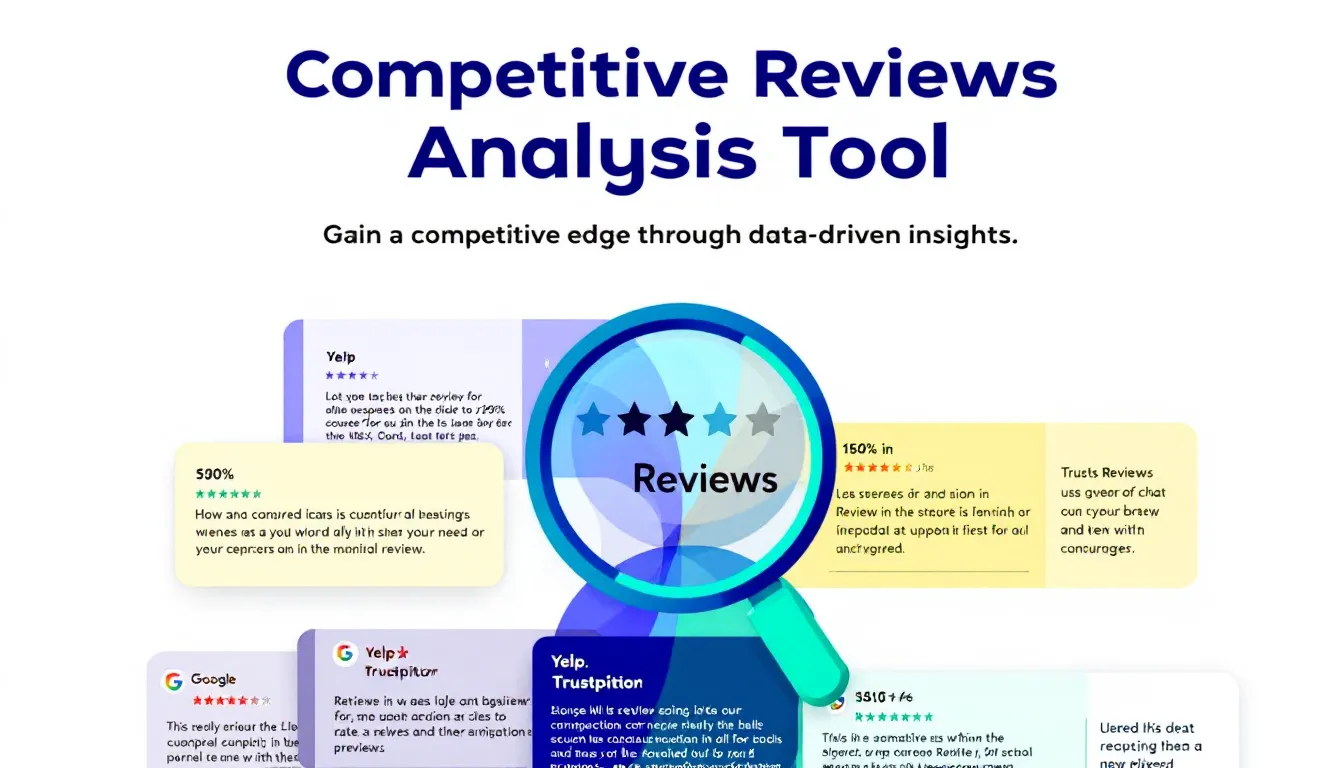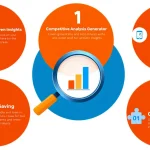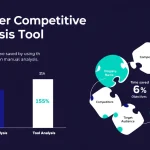Is this tool helpful?
How to Use the Competitive Review Analysis Tool Effectively
1. Enter Your Company Name
Provide your official company name to ensure the analysis focuses correctly on your business. Here are two examples:
- BlueWave Digital Media
- FreshFields Organic Farms
2. List Competitors to Analyze
Enter your primary competitors’ names, placing each on a new line. Accurate competitor input helps generate a precise comparison. Here are sample competitor lists:
- BlueWave Digital Media:
- BrightPixel Studios
- CreativeSpark Agency
- NextGen Marketing
- FreshFields Organic Farms:
- GreenHarvest Organics
- PureFarm Naturals
- EcoCrop Solutions
3. Select the Review Period
Choose the timeframe for the competitor review data you want to analyze. Common choices include:
- Last 9 months
- Current fiscal year
What Is the Competitive Review Analysis Tool and Why Use It?
The Competitive Review Analysis Tool helps you compare customer feedback and online ratings for your business against key competitors. By aggregating and analyzing review data from various platforms, it identifies trends and key themes in customer sentiment. You gain clear insight into how your company ranks in customer satisfaction, strengths, and weaknesses compared to the competition.
This tool supports smarter decision-making by turning raw review data into actionable feedback. It highlights areas where you outperform rivals and where you can improve, helping you shape strategies in marketing, product development, and customer service.
Key Benefits of the Competitive Review Analysis Tool
- Spot emerging customer trends and preferences
- Identify gaps in the market your business can fill
- Compare strengths and weaknesses across competitors
- Track shifts in customer opinions over selected timeframes
- Improve strategic planning with data-backed insights
How You Can Use the Competitive Review Analysis Tool in Practice
This tool serves as a powerful resource for market research and competitor benchmarking. It allows you to:
Market Research Improvement
Analyze competitor customer reviews to uncover consumer preferences, common complaints, and areas where competitors excel or fall short. Use these insights to accurately target new market opportunities.
Enhance Customer Experience
By understanding competitor feedback, you can anticipate issues customers face and address similar challenges proactively within your own business. This leads to better customer satisfaction and loyalty.
Strategic Business Adjustments
- Refine product features based on customer pain points in your industry
- Adjust marketing messaging to emphasize areas where you lead
- Optimize service delivery taking lessons from competitor mistakes
Real-Life Applications of the Competitive Review Analysis Tool
Example 1: Boutique Hotel Chain Review
A boutique hotel chain analyzed guest reviews from key rivals over nine months and discovered:
- Positive trends: Friendly staff and prime locations
- Negative trends: Complaints about outdated room decor
- Action taken: Renovated rooms which led to a 20% increase in guest satisfaction scores
Example 2: SaaS Platform Customer Feedback
An SaaS provider reviewed competitor feedback during a product launch, identifying:
- Strengths: Easy onboarding experience praised by customers
- Weaknesses: Slow customer support response times
- Outcome: Improved support team training, reducing response time by 40%
Frequently Asked Questions About Competitive Review Analysis
Who benefits most from this competitive review analysis tool?
Any company operating in competitive markets benefits, including retail businesses, service providers, tech firms, and restaurants. If you want to understand how customers view you versus competitors, this tool offers valuable insights.
How often should I perform review analysis?
Quarterly or bi-annual reviews typically provide good balance. However, adjust frequency based on market changes and product cycles—monthly analysis may be helpful during peak periods or new launches.
Can the tool help with product or service improvements?
Yes. It highlights features customers appreciate and pain points in competitors’ offerings. Use these insights to guide development and tailor your products or services better.
What is the best way to apply the insights from the tool?
Focus on actionable data. Address common customer complaints and build on strengths found in reviews. Integrate findings into your business strategy for measurable improvements.
Should I analyze all competitors or just a few?
Start with 3 to 5 direct competitors targeting similar customers. This focus ensures more relevant and manageable insights for strategic decisions.
Best Practices for Conducting Competitive Review Analysis
Establish Regular Monitoring
Set a consistent schedule to track competitor review trends and spot emerging market shifts early. Regular updates maintain your competitive edge.
Plan and Document Actions
- Record key findings clearly
- Prioritize improvements based on impact and feasibility
- Define specific goals with deadlines
- Monitor implementation progress and effectiveness
- Review and adjust strategies regularly
Align Analysis with Business Strategy
Incorporate competitive insights into decisions across departments—product teams, marketing, and customer service—to ensure unified improvements based on customer feedback.
Maximizing Value from Competitive Review Data
Interpreting Data Effectively
- Identify recurring themes across multiple competitors
- Account for seasonal or market changes influencing reviews
- Balance both quantitative (ratings) and qualitative (comments) data
- Extract insights you can act upon
Implementing Strategic Changes
- Create clear action plans based on analysis
- Set realistic timelines to achieve goals
- Monitor improvements and adjust as needed
Important Disclaimer
The calculations, results, and content provided by our tools are not guaranteed to be accurate, complete, or reliable. Users are responsible for verifying and interpreting the results. Our content and tools may contain errors, biases, or inconsistencies. Do not enter personal data, sensitive information, or personally identifiable information in our web forms or tools. Such data entry violates our terms of service and may result in unauthorized disclosure to third parties. We reserve the right to save inputs and outputs from our tools for the purposes of error debugging, bias identification, and performance improvement. External companies providing AI models used in our tools may also save and process data in accordance with their own policies. By using our tools, you consent to this data collection and processing. We reserve the right to limit the usage of our tools based on current usability factors.







